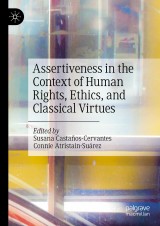Details

Assertiveness in the Context of Human Rights, Ethics, and Classical Virtues
|
139,09 € |
|
| Verlag: | Palgrave Macmillan |
| Format: | |
| Veröffentl.: | 11.09.2024 |
| ISBN/EAN: | 9783031609626 |
| Sprache: | englisch |
| Anzahl Seiten: | 288 |
Dieses eBook enthält ein Wasserzeichen.
Beschreibungen
<p>Whether in everyday disagreements, bargaining episodes, or high-stakes disputes, people typically see a spectrum of possible responses to dealing with differences with others, ranging from avoidance and accommodation to competition and aggression. When coming across such circumstances, it is crucial to advocate for oneself –our positions, to achieve personal goals, overcome difficulties, and be determined- but control aggressive impulses without harming the rights and interests of others. </p><p>This book addresses assertiveness from a human rights perspective, using a mixed methods approach. It explores how assertiveness as a human right promotes human dignity and helps build more just, equitable, peaceful, and inclusive societies. With interdisciplinary contributors working in diverse fields, the collection brings together theoretical and applied research evidence on assertive rights. The collection examines assertive rights as critical factors for developing assertive behavior and as a virtue for personal development, empowerment, and thriving.<br></p>
<p>Chapter 1. “I’m OK, You’re OK” Philosophy: Promoting a Culture of Respect, Equity, Justice, and Peace Through Assertiveness—An Introduction.- Part I Assertiveness as a Human Right and Virtue.- Chapter 2. Assertiveness and Human Rights Origins, Exercise, Education and Duties: How Assertiveness Can Help Us Better Understand Human Rights.- Chapter 3. The Right to an Assertive Life: Assertiveness as a Human Right.- Chapter 4. Tracing Classical Roots of Assertiveness: The Aristotelian Virtue.- Part II Assertiveness from a Social Perspective.- Chapter 5. The Importance of Assertiveness in Social Anthropology.- Chapter 6. Assertiveness: A View from the Perspective of Reflexivity.- Chapter 7. Assertive Rights and Intervention in Social Work.- Part III Assertiveness for Building a Culture of Virtue, Peace, and Equity.- Chapter 8. Ethics, Decision-Making, and Assertive Communication.- Chapter 9. Assertiveness, Conflict, and Peacemaking.- Chapter 10. Assertive Leadership for the Protection of Human Rights: Inclusion and Gender Perspective in the Autonomous University of Nuevo León.- Part IV Exercising the Right to be Assertive.- Chapter 11. Assertiveness as a Human Right: Its Configuration from<br>
the Dignity of the Person in Situations of Vulnerability.- Chapter 12. Sexual Assertiveness in Mexican Homeless Female Youth: A Qualitative Approach.- Chapter 13. Assertiveness: A Tool for Social Change and Shared Value.- Chapter 14. Assertiveness in the Context of Human Rights, Ethics, and Classical Virtues: Final Reflections.</p>
the Dignity of the Person in Situations of Vulnerability.- Chapter 12. Sexual Assertiveness in Mexican Homeless Female Youth: A Qualitative Approach.- Chapter 13. Assertiveness: A Tool for Social Change and Shared Value.- Chapter 14. Assertiveness in the Context of Human Rights, Ethics, and Classical Virtues: Final Reflections.</p>
<p>Susana Castaños-Cervantes is a professor at Universidad Panamericana, Mexico.</p><p>Connie Atristain-Suárez is a professor and researcher at the Universidad Panamericana, Mexico</p>
<p>Whether in everyday disagreements, bargaining episodes, or high-stakes disputes, people typically see a spectrum of possible responses to dealing with differences with others, ranging from avoidance and accommodation to competition and aggression. When coming across such circumstances, it is crucial to advocate for oneself –our positions, to achieve personal goals, overcome difficulties, and be determined- but control aggressive impulses without harming the rights and interests of others. </p>
<p>This book addresses assertiveness from a human rights perspective, using a mixed methods approach. It explores how assertiveness as a human right promotes human dignity and helps build more just, equitable, peaceful, and inclusive societies. With interdisciplinary contributors working in diverse fields, the collection brings together theoretical and applied research evidence on assertive rights. The collection examines assertive rights as critical factors for developing assertive behavior and as a virtue for personal development, empowerment, and thriving.</p>
<p><strong>Susana Castaños-Cervantes </strong>is a professor at Universidad Panamericana, Mexico.</p>
<p><strong>Connie Atristain-Suárez</strong> is a professor and researcher at the Universidad Panamericana, Mexico.</p>
<p>This book addresses assertiveness from a human rights perspective, using a mixed methods approach. It explores how assertiveness as a human right promotes human dignity and helps build more just, equitable, peaceful, and inclusive societies. With interdisciplinary contributors working in diverse fields, the collection brings together theoretical and applied research evidence on assertive rights. The collection examines assertive rights as critical factors for developing assertive behavior and as a virtue for personal development, empowerment, and thriving.</p>
<p><strong>Susana Castaños-Cervantes </strong>is a professor at Universidad Panamericana, Mexico.</p>
<p><strong>Connie Atristain-Suárez</strong> is a professor and researcher at the Universidad Panamericana, Mexico.</p>
Presents a thorough introduction to assertive rights for a variety of disicplines Provides a comprehensive analysis and criticism of assertive rights Gives attention to critical stances on human rights, particularly among vulnerable groups
Diese Produkte könnten Sie auch interessieren:

Derecho y sociedad en Kant

von: Cubo Óscar, Herrero Laura, Leyva Gustavo, Sánchez Madrid Nuria

10,99 €
















